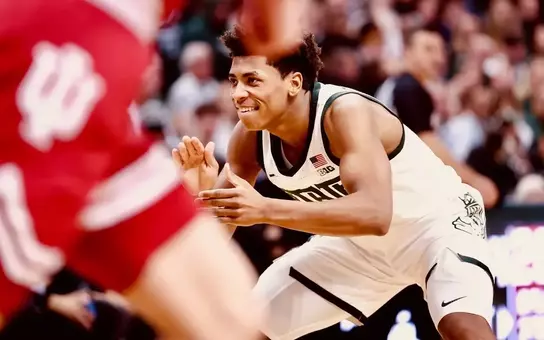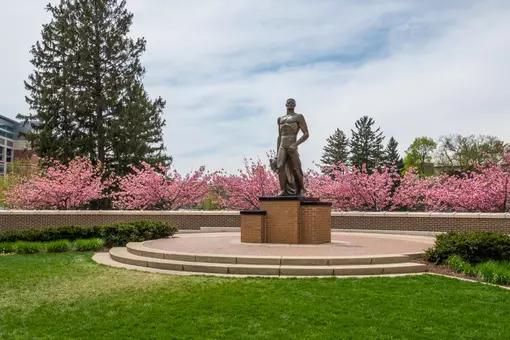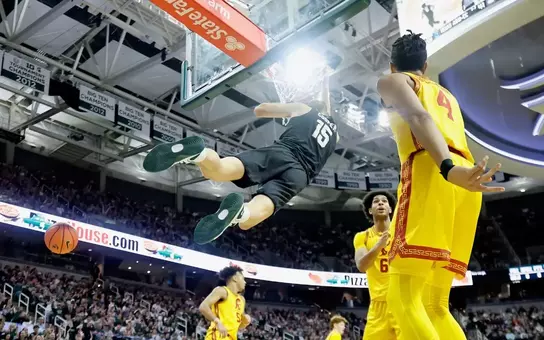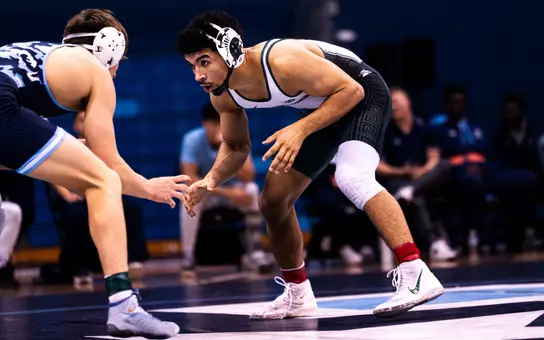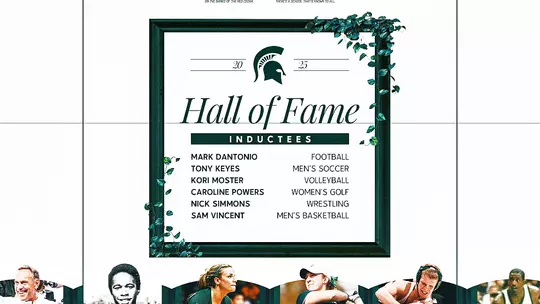
Michigan State Athletics Announces 2025 Hall of Fame Class
6/30/2025
***NOTE: Tickets to the 2025 MSU Athletics Hall of Fame Induction Ceremony are SOLD OUT!***
EAST LANSING, Mich. - Five standout student-athletes and one iconic coach comprise the Michigan State Athletics Hall of Fame Class of 2025. Mark Dantonio (football), Tony Keyes (men’s soccer), Kori Moster (volleyball), Caroline Powers (women’s golf), Nick Simmons (wrestling), and Sam Vincent (men’s basketball) will be inducted into the Hall of Fame in September.
“The six members of the Michigan State Athletics Hall of Fame Class of 2025 embodied excellence throughout the course of their Spartan careers,” said Michigan State Vice President and Director of Athletics J Batt. “They are among the very best to ever wear the Green and White, as their impact has established a foundation for future success. We look forward to welcoming these great Spartans back to campus and celebrating their achievements this September.”
The Hall of Fame Induction Ceremony and Celebration will take place on Friday, Sept. 12. There will also be a special recognition of the 2025 MSU Athletics Hall of Fame Class during the Michigan State-Youngstown State football game at Spartan Stadium on Saturday, Sept. 13. The MSU Athletics Hall of Fame, located in the Clara Bell Smith Student-Athlete Academic Center, opened on Oct. 1, 1999, and displays plaques of the 187 previous inductees. The charter class of 30 former Spartan student-athletes, coaches and administrators was inducted in 1992.
Below are the bios for the 2025 Michigan State Athletics Hall of Fame Class:
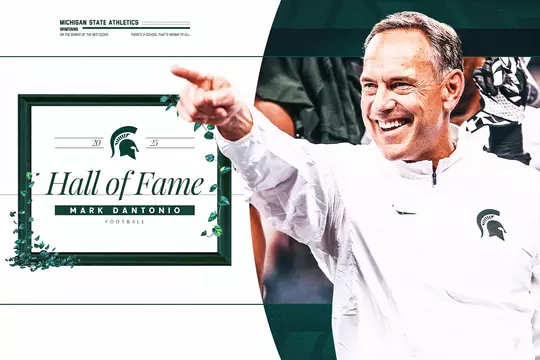
Mark Dantonio
Football (Head Coach 2007-2019; Secondary Coach 1995-2000)
Zanesville, Ohio
Mark Dantonio, the winningest coach in Michigan State football history, has been honored across the country in several Halls of Fame following his record-setting career, but this time, he will be enshrined in a building where he worked on campus while establishing the Spartan program as one of the best in the nation.
Following a year in which he was inducted into the College Football Hall of Fame and the Rose Bowl Hall of Fame, Dantonio becomes the sixth head football coach in Michigan State history to join the MSU Athletics Hall of Fame.
“For 13 years, we pushed forward to build something special – something timeless,” said Dantonio. “This achievement reflects the dedication and hard work of all those individuals who excelled and helped create a TEAM.
“This honor embodies the legacy we built together at MSU. Together, we ‘Dreamed Big’ and didn’t just make history – we became a part of it.”
Dantonio was also inducted into the Polish-American Sports Hall of Fame in June 2022 and was named the 2023 recipient of the "Heart of a Champion" Award at the Paul "Bear" Bryant Awards ceremony in Houston.
After a storied 13 seasons as head coach of the Michigan State football program, Dantonio announced his retirement on Feb. 4, 2020. He finished his career with a record of 114-57 in East Lansing, 132-74 in 16 seasons overall. During his time at the helm of the Spartan program, Dantonio compiled an impressive list of accomplishments including three Big Ten Championships, two victories in the Big Ten Championship Game, victories in the 2014 Rose Bowl and the 2015 Cotton Bowl, and an appearance in the 2015 College Football Playoff.
Beyond his record for most victories at MSU, Dantonio won more Big Ten Championships (three) and bowl games (six) than any other coach in school history, while also ranking first with 12 bowl appearances. His .639 (69-39) winning percentage in Big Ten games is also a school record, while he stands second in AP Top 25 finishes (seven), Big Ten wins (69), home wins (67) and AP Top 25 wins (21).
Dantonio's tenure at Michigan State also placed him among the best football coaches in Big Ten history. He retired as one of just seven Big Ten coaches to have at least six 10-win seasons on their resume and one of four to have at least five 11-win seasons. Dantonio finished his career ranked No. 11 in the Big Ten record books in both overall wins (114) and Big Ten wins (69). With MSU's win in the 2019 Pinstripe Bowl, Dantonio secured his sixth bowl victory, tying him for fourth most in Big Ten history.
A two-time Big Ten Coach of the Year (2010, 2013), Dantonio led Michigan State to Top 25 finishes seven times (2008: No. 24 in both polls; 2010: No. 14 in both polls; 2011: No. 10 USA TODAY/No. 11 AP; 2013: No. 3 in both polls; 2014: No. 5 in both polls; 2015: No. 6 in both polls; 2017: No. 15 AP/No. 16 USA TODAY). MSU was the only school to finish in the top-six of the national polls from 2013-15 (No. 3 in 2013, No. 5 in 2014, No. 6 in 2015) and the 36 wins from 2013-15 marked the winningest three-year stretch in the history of the program.
The 2010s decade was the greatest in Michigan State history based on total wins, as the Spartans posted a 92-40 (.697) record from 2010-19. During that span, MSU won six bowl games (2012 Outback, 2012 Buffalo Wild Wings, 2014 Rose, 2015 Cotton, 2017 Holiday, 2019 Pinstripe), three Big Ten Championships (2010, 2013, 2015) and three Big Ten Division titles (2011, 2013, 2015). The 92 wins were the seventh-most ever by any Big Ten team in a decade and the six bowl wins tied for second most by any Big Ten program in a decade.
Dantonio made history by becoming the first Big Ten coach to record five 11-win seasons in a six-year span following MSU's 12-win campaign in 2015 (11 in 2010; 11 in 2011; school-record 13 in 2013; 11 in 2014; 12 in 2015). His five 11-win seasons were tied for third most in Big Ten history during the time of his retirement. Prior to Dantonio's arrival, MSU had not recorded an 11-win season in its history, and had just two 10-win seasons (1965, 1999).
Michigan State played in a school-record nine consecutive bowl games from 2007-15 (2007 Champs Sports Bowl, 2009 Capital One Bowl, 2010 Alamo Bowl, 2011 Capital One Bowl, 2012 Outback Bowl, 2012 Buffalo Wild Wings Bowl, 2014 Rose Bowl, 2015 Cotton Bowl, 2015 College Football Playoff Semifinal at Cotton Bowl). Dantonio extended his school record with his 12th bowl game appearance in 2019 in the Pinstripe Bowl; he finished 6-6 in bowl games at Michigan State, including a school-record four-game winning streak (2012 Outback, 2012 Buffalo Wild Wings, 2014 Rose, 2015 Cotton).
Michigan State had a record-setting season in 2013, winning a school-record 13 games, defeating No. 5 Stanford in the 100th Rose Bowl Game, beating No. 2 Ohio State in the Big Ten Championship Game, and finishing No. 3 in both national polls, the highest ranking for the Spartans since 1966. Michigan State (13-1) became just the third team in Big Ten history to win 13 games in a season.
Dantonio won his 110th game as head coach at Michigan State with a 31-10 victory over Northwestern on Sept. 21, 2019, surpassing Hall of Fame Coach Duffy Daugherty for the most wins in school history. Dantonio had 11 winning seasons in his 13 years in East Lansing, tying Daugherty for the most winning seasons by a Spartan head coach.
A Zanesville, Ohio, native with Midwest ties, Dantonio spent 40 years in collegiate coaching, including 16 seasons as a head coach (three at Cincinnati from 2004-06; 13 at Michigan State from 2007-19) and 19 seasons overall in East Lansing (served as the Spartan secondary coach from 1995-2000). He returned to assist the Spartans in an off-field coaching role during the 2023 season as the program's associate head coach. Prior to his appointment at Cincinnati, Dantonio served as the defensive coordinator at Ohio State for three seasons (2001-03), where his defensive unit helped the Buckeyes to a combined record of 32-6, including the 2002 National Championship.
From the moment he stepped on campus, Dantonio was equally committed to success in the classroom. In his 13 seasons, a total of 238 players earned their undergraduate degrees. In addition, 219 Spartans earned Academic All-Big Ten honors, including nine Academic All-America selections.
Dantonio was elected to the College Football Hall of Fame on Jan. 8, 2024, his first year on the ballot, and the official induction in December 2024 capped a busy year of accolades for the three-time Big Ten Champion coach.
The National Football Foundation hosted the Hall of Fame On-Campus Salute on Sept. 28, 2024, in Spartan Stadium for the MSU-Ohio State game, and for becoming the latest Spartan in the College Football Hall of Fame, Dantonio's name was added to the Spartan Stadium Ring of Fame on the east upper deck.
Dantonio was inducted into the Rose Bowl Hall of Fame at a ceremony held by the Pasadena Tournament of Roses on Dec. 31, 2024, and opened the New Year while being honored in the 136th Rose Parade and on the field at the Rose Bowl Game.
Dantonio was named to the College Football Playoff Selection Committee in March 2025 and his three-year term began in the spring.
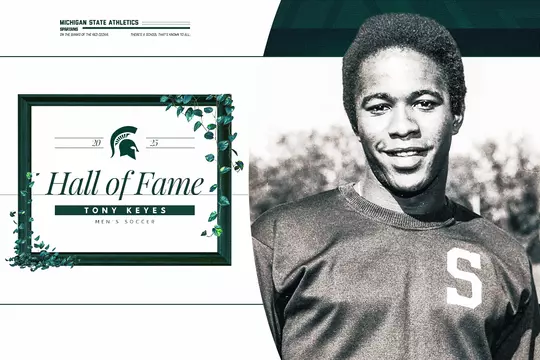
Tony Keyes
Men’s Soccer (1966-68)
Kingston, Jamaica
Nearly 60 years after he played in East Lansing, Tony Keyes continues to be the most prolific scorer in Michigan State men’s soccer history. The story of Michigan State soccer cannot be told without also telling the tale of Tony Keyes. His lasting impact can be felt on the Spartan pitch to this day.
Upon finding out that he was joining the 2025 Michigan State Athletics Hall of Fame class, Keyes couldn’t wait to spread the news.
“I was very ecstatic and very elated. I told my wife immediately, and she started calling my son and my daughter, and everybody, so we're all excited. We're looking forward to the event,” Keyes said.
He will be joining some of the biggest names in MSU soccer history, including fellow Jamaican Trevor Harris, as well as Guy Busch and Joe Baum, who were all teammates.
“It means a lot, because I know all these people personally, so that makes a very big difference,” Keyes said. “We're friends, and I know them all, and it was a good incentive for me to be looking forward to it one day if I got into the Hall of Fame. I will be in very good company.”
Keyes was part of the pipeline of players from Kingston, Jamaica, to play for head coach Gene Kenney and the Spartans in the late 1960s, including Harris, Frank Morant and Les Lucas. All four prepped at Kingston College together, but it was another Jamaican, Payton Fuller (1963-65), who convinced Coach Kenney that Keyes needed to wear the Green & White.
Kenney needed some convincing that the undersized Keyes could compete at the Division I level.
“Yes, well, my first day at MSU, and the first practice, we had the coach, Gene Kenney, seeing me for the first time, and I'm not a very big guy,” Keyes said. “I'm just 5-7 and a half, and he saw me and said ‘Oh no, I made a mistake with that scholarship. He’s not going to be able to play against Army and Navy and so on and so forth.’ But guess what? After the first practice, I earned the respect of everyone, and from that day forward, it was the greatest thing for me. I knew everybody on the team, both varsity and freshmen. My life at MSU was very good after that first day. So that stood out for me.”
The Kingston, Jamaica, native is still second in the Michigan State record books with 129 points and stands first in all-time goals scored with 56 from 1966-68.
Keyes started his Spartan career with a bang in 1966, earning the first of two All-American honors as a sophomore. In 1966, he was second on the team in points scored behind fellow MSU Hall of Fame Inductee Guy Busch. Keyes scored 21 goals that season which still stands as fifth-most in MSU history. He also tied the single-game record with five assists against Purdue. The Spartans reached the national semifinals in 1966, tying Long Island, 2-2 with LIU advancing on corner kicks.
During the 1967 campaign, Keyes battled through a hamstring injury that kept him sidelined for the last half of the season. The Spartans outscored their opponents, 73-11, and finished with a stellar record of 12-0-2. They settled a score with Long Island with a 4-0 win in the NCAA semifinals. Michigan State would share the NCAA Championship with St. Louis after the national title game was canceled due to weather.
“After my first year playing varsity for Michigan State, I said to the coach, ‘if you want to win the NCAA Championships, then you have to send to Jamaica to get Trevor Harris. We both went to the same high school, and we played together,’” Keyes explained. “So, I told the coach, you guys have to go get this guy so we can win this championship. And so, he listened to me and made it happen. In 1967, we won the first championship in soccer for MSU, even though the game was postponed because of weather conditions. But that was a very, very great feeling, because we've been to the Final Four before, but we've never been able to get over the hump. And then the second year, when we went in 1968 which was the year I captained the team, that was a great, great feeling, too, because it's never been done at MSU before. And then to do it back-to-back, was quite an achievement.”
In 1968, Keyes scored 28 goals, which still stands as the single-season record at MSU, as the Spartans battled to an 11-1-3 record. In the national semifinal, Michigan State defeated Brown, 2-0, to return to the title contest. With a 2-2 draw against Maryland in the national title match, the Spartans repeated as co-champions. The Spartan captain once again captured All-American honors that season.
The kinship that Keyes felt with his fellow countrymen was also an important part of the journey.
“We had very good understanding because Trevor Harris and I had been playing together on high school teams since we were about 13-years old,” Keyes said. “So, I've known him all my life. He's my best friend. And then Payton Fuller, who was also an All-American soccer player, and he told Gene Kenney about me. And that was when he started recruiting me from Jamaica. So, playing with my fellow countrymen, that felt really good, because I was far away from home.”
After his time on the pitch was done, Keyes went on to become a dentist. He earned his doctorate of dental surgery from Howard in 1976. He also went back to Jamaica treating school-aged children. He returned to Michigan practicing dentistry in Grand Rapids before earning a master’s degree of public health from Johns Hopkins in 1986. He worked at Children’s National Hospital in Washington, D.C. for over 20 years before retiring.
According to Keyes, none of the accolades of success would have been possible if it weren’t for his wife Geri, who he met at Michigan State.
“As a matter of fact, she saved my life in 1967 when I had an appendicitis situation, and everybody was gone for the Thanksgiving weekend, and I was at home, really dying. And she took me to Olin Health Center, and they had to do emergency surgery,” Keyes said.
Aside from his family, Keyes thanks all of his coaches from Jamaica to Kenney at Michigan State, and all the friends and the teammates along the way who helped shape the man that he would become today: an MSU Athletics Hall of Famer.
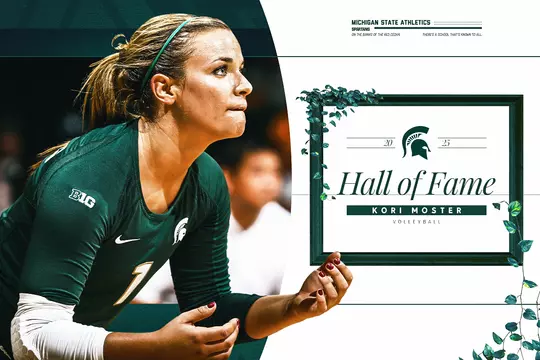
Kori Moster
Volleyball (2011-14)
Cincinnati, Ohio
Kori Moster concluded a spectacular four-year career in the Green and White as a three-time All-American, three-time All-Region honoree, two-time Big Ten Defensive Player of the Year and three-time All-Big Ten selection. She still sits in third all-time in the Big Ten in career digs (2,218) in what is regarded as the most competitive conference in college volleyball. At Michigan State, Moster’s career digs top the second-highest total by over 700 digs. She also holds four of the top-10 single-season dig totals in Spartan history.
Now 10 years removed from her graduation, the three-time team captain can call herself a Michigan State Athletics Hall of Famer.
“I was very surprised when I answered the phone and it was (Director of Athletics) J Batt,” said Moster. “I was completely taken aback. I feel like there’s not many types of awards that could emotionally trigger me, and this one absolutely did. It was super special. I never actually thought that this would be an award that I would be receiving, so it’s very surreal.”
To make the moment even more special, Moster got the chance to talk to former co-captain and current Michigan State volleyball head coach Kristen Kelsay shortly after hearing the news of her induction.
“We jumped on a call and it immediately took me back to the bonded times of being captains together,” said Moster. “But it also reconnected me to the school. There’s nothing like having my old teammate being the new head coach and feeling so proud. I’m excited about this too, being able to support her. It’s just so special.”
“I think when I first heard that Kori was being inducted into the Hall of Fame, I was bursting with pride for her, not only for what she did for the Spartan volleyball program, but also my personal relationship with her and what she did for me over our time together as teammates and captains,” said Kelsay. “She’s one of the best to ever do it, not only at Michigan State, but in the Big Ten and the country. From being named MSU’s first Big Ten Defensive Player of the Year to helping really transform this program.”
Moster arrived in East Lansing in 2011 and appeared in all 34 matches for the Spartans during her freshman season. Behind a freshman-record 474 digs with Moster in the back row, MSU finished the season at 22-12, notching its highest win total since 1998, and made the second round of the NCAA Tournament after missing the tournament the year prior. She was honored as Big Ten Freshman of the Week three times and was named Big Ten Defensive Player of the Week after a then-career-best 28 dig performance against Ohio State.
The accolades began pouring in for Moster during her sophomore season, who began her first of three seasons as a captain and one of two alongside Kelsay in 2012. She was named MSU’s first-ever Big Ten Defensive Player of the Year and tallied 602 digs, good for second all-time in school history. The Spartans put together a 25-10 season that included a pair of top-10 B1G victories, highlighted by a 3-2 upset win over No. 4 Nebraska, and advanced to the Sweet 16 after a win over defending national champion UCLA in the second round, which Moster cites as a career-defining moment.
“The one memory that very much sticks out to me is when we played UCLA at UCLA in the NCAA Tournament and they were the reigning national champions,” said Moster. “We were on their home court and nobody expected us to win. It was one of those ‘whole bench flooded the floor’ moments, I actually remember the feeling of playing in that game. It could make me cry because it was just so much determination. It was such a grind, point after point. That team was huge and so strong and we just grinded it out. One of those moments you’ll just never forget.”
Moster earned Honorable Mention All-America honors from the American Volleyball Coaches Association (ACVA) at the conclusion of that season, the first Spartan libero to do so.
MSU reached its second Sweet 16 in as many years during Moster’s junior season in 2013. The Spartans posted a 23-12 record, while Moster recorded 592 digs to place third on the Spartans’ single-season list. She captured her second-straight Big Ten Defensive Player of the Year award and was named a Third Team All-American by the AVCA.
Moster wrapped her final collegiate season with a third All-America nod, earning Honorable Mention honors from the AVCA in 2014 to become MSU’s only three-time AVCA All-American. MSU earned a bid to its fourth-straight NCAA Tournament and Moster reached the 2,000-career digs mark while tallying the fourth-best single-season total in program history with 550 digs. In addition to her Big Ten and AVCA honors, she also was a finalist for the 2014 Senior CLASS Award for volleyball, given to an NCAA Division I senior in each sport who exemplified excellence in the four areas of community, classroom, character and competition and was the recipient of MSU’s Chester Brewer Leadership Award in 2015.
“What made Kori special was her leadership and the way she was able to command the court, not only from her position as libero, but from her will to win,” said Kelsay. “Kori just had this impeccable competitiveness and will to win that she wouldn’t allow her team to lose. It was often seen from the outside with her defensive plays, but we felt it as her teammates through her heart and through her love for us and her love for Spartan volleyball.”
Moster was also a standout in the classroom during her four seasons in East Lansing, earning Academic All-Big Ten honors three times, and was twice named a Big Ten Distinguished Scholar.
At her induction this fall, she will be joined by her three former coaches at Michigan State – former head coach Cathy George and assistants Russ Carney and Mike Gawlik.
“Every single one of them are insanely special to me to this day,” said Moster. “I saw Cathy last weekend. Russ committed to me that he would stay coaching (at Michigan State) through my whole career and he did - he ended up retiring at the same time I was graduating. Mike is the one who taught me from a skill standpoint of what to change, what to lean into as a defender. I wouldn’t be the player I was in college without him.”
She also credits athletic trainer Lianna Hadden and academic coordinator Mandy Chandler for her success on and off the court and her teammates who helped shape her experience in East Lansing.
“My teammates in my class, we were in it together,” said Moster. “Kristen (Kelsay), who was my co-captain and helped me lead a team. My best friend and teammate Halle Peterson, who was my maid of honor, and I was her maid of honor. When people say it’s all about the people, she’s the one who can just make me teary-eyed even talking about her because I’m just so grateful for the friendship that this team brought to me and her.”
She is the sixth Spartan volleyball player to be inducted into the MSU Athletics Hall of Fame, joining Val Sterk (2007 inductee), Dana Cooke (2011), Diane Spoelstra (2012), Jenna Wrobel (2013), Kathy DeBoer (2022), and the first player from the 2000s to be inducted.
“I was actually taking a look at all of the names of the previously inducted players,” concluded Moster. “Those were the people when I was back playing, the names were present and known to me even though I never watched them play. It always felt like something that I wanted to be a part of, so just the opportunity to be amongst that group of women is pretty awesome.”
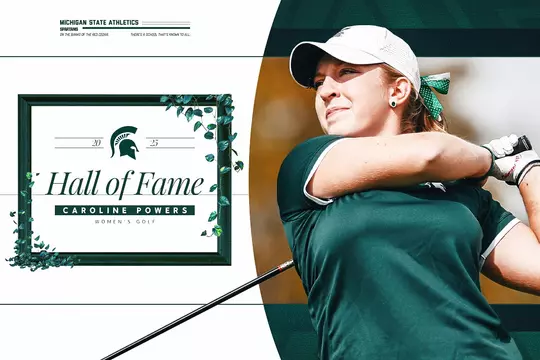
Caroline Powers
Women’s Golf (2009-2013)
Bowling Green, Ohio
When Caroline Powers stepped on Michigan State’s campus during a visit as a high schooler, she knew she had found a home.
Everything seemed right for her – from the campus to academics and, of course, the women’s golf program.
“It became home instantly, I would say,” Powers said. “I think one of the reasons why I chose to come here in the first place was because of that sense of home and that sense of family.”
Powers joined the women’s golf program in 2009 and proceeded to rewrite the Spartan record book in the process, becoming one of the most decorated golfers under legendary head coach Stacy Slobodnik Stoll.
Yet, when she received the phone call that she was going to be inducted into the Michigan State Athletics Hall of Fame as part of the 2025 Class, the thought was far from her mind, but one she had worked toward while playing to follow I the footsteps of her cousin, Emily Bastel (MSU HOF 2012).
“I wasn’t even expecting it and when I got the call, I got chills,” Powers explained. “Stacy was playing (in the Michigan Open) so I couldn’t wait to call her, say thanks and chat about it. It was really, really exciting.”
What was equally as exciting is what Powers did during four years of playing for Michigan State, both on and off the course.
Powers graduated with a 3.87 grade-point average, was a Second Team Academic All-America selection, an Academic All-Big Ten selection three times, and was the recipient of the Big Ten Conference Medal of Honor and the Chester Brewer Leadership Award.
On the course, she was just as successful, if not more. Powers completed her career as the school's all-time record holder in scoring average (74.26, now seventh best) and owned the top three single-season scoring averages in program history, including her record 73.53, which she set as a sophomore (which is now 14th).
Powers was a three-time honorable mention All-American and All-Big Ten First Team selection, the 2013 Big Ten Player of the Year and was the recipient of the Alderton Award, given to the top female student-athlete at MSU, three straight years.
She helped lead the Spartans to back-to-back Big Ten Championships in 2011 and 2012 and a school-record finish at the 2013 NCAA Championships as the team tied for ninth place. In addition, she qualified as an individual for the 2011 NCAAs and placed sixth, tied for the highest finish ever by a Spartan at nationals.
In her senior season, Powers posted six top-10 finishes in MSU's 11 tournaments and compiled a 73.81 average, the third lowest in school history at the time. Powers finished runner-up at the Big Ten Championships with a 3-over 219 and was named to the All-Championships Team for the third-straight year. She closed the season ranked No. 30 in the nation by Golfweek and had the highest Golfweek/Sagarin rating in Big Ten competition with a 72.11.
Yet, the records she was setting and the awards she won never really stood out for her.
“To me, it was just like, ‘Let’s see how good I can get.’’ Powers said. “So much of that is a testament to Stacy and (former assistant) Lorne Don, for seeing my potential when I didn’t. I was just coming along, trying to follow what the others were doing and showing us. I was a freshman when Laura Kueny was a senior and she was a great person to understand golf from and competitiveness from.
“I think my sister is probably the one that tries to remind me of (the awards), and I think it feels a little odd for me. When you get into coaching and you get into motherhood, you forget about the things that got you to that place. But I think if I look at it on paper, without my name attached to it, it really surprises me. It’s pretty awesome that a girl from Bowling Green, Ohio achieved those awards.”
Powers is not surprised to see the records she set as a collegian broken by the golfers who followed in her footsteps, including several she coached during six years as an assistant to Slobodnik Stoll from 2016-22.
“I think that when you are in it, it seems very obvious. ‘Of course we’re going to win a conference championship and be at the national championships.’ But when you get on the coaching side, you realize how hard it is to do what Stacy has continued to do for her entire career,” Powers said. “And to continue to produce people who are breaking records of the previous players, that’s the goal - to set a bar, and to have the next generation of people break it and continue to grow and drive.
“It’s really amazing and I think it’s a point of pride, especially to be a Northern school. I think the culture she has built and what it means to be a Spartan is what has sustained the on-course performance so much because everybody that comes to Michigan State and plays for Stacy, they all feel that. In a world where it’s easy to go to a school and just put in your time and leave, that’s just not how it goes at Michigan State. That’s why the success continues to come.”
Her playing career and relationship with her head coach spawned a relationship that not only helped Powers in her career path, but also helped her find a home.
“Being a Spartan is everything to me,” Powers said. “So much of my life that’s come even since then, it’s all because of Michigan State.
“Having Stacy be a mentor and help me with golf, to start working there and getting into the coaching world because of it, to meeting Dan (Ellis, her husband, a former MSU men’s assistant coach), that’s led to our family, that led to my sister moving to town and her family. There’s so many of these parts of my life that have come about, it’s all tied back to Michigan State. I am so proud to be a Spartan and just forever thankful for everything that the University and the golf program have done for me and my family.”
Following her time as an assistant at MSU, Powers took over as the head coach at Notre Dame for three years before stepping aside to move home, to East Lansing, to care for her growing family. The timing on her family’s move back to the area later this summer, with the Hall of Fame induction soon after, will be something she won’t forget.
“I haven’t envisioned it, but when you go to a college town, there’s always that sense of home,” Powers said. “But also, when you’re gone for any amount of time, so many things change, there’s new buildings, there’s new people, there’s all of those factors. Regardless of those changes, it’s still home for me and Dan. To be able to see my name go up there and be able to celebrate with my family and the people that made it happen, that’s going to be pretty special.”

Nick Simmons
Wrestling (2001-07)
Williamston, Mich.
Known for his suffocating top wrestling, signature spladle and pinning prowess, Nick Simmons is one of the most decorated wrestlers in Michigan State program history. His induction into the Michigan State Athletics Hall of Fame marks the 11th Spartan wrestler and 13th member of the wrestling program at MSU to be inducted.
“It’s a great honor to be inducted into the Michigan State Hall of Fame,” said Simmons. “When I received the call from J Batt just a week into the job, I was kind of curious what it could be about, but it’s a special honor to join an elite group of former Spartan wrestlers in the Hall of Fame.”
With a career record of 138-20, Simmons finished his collegiate career with the second-most wins in Spartan history. Simmons still has a stranglehold on Michigan State’s all-time pins mark with 46, breaking the previous record of 45 set by Jim Mason that stood from 1984 to 2007, and no Spartan has come close since. His 46th pin came during his last home dual at Jenison Field House, in the final bout of the night. Of his 20 career losses, 12 came during his redshirt freshman season after which he’d finish his career going 109-8.
Simmons was a four-time NCAA All-American where he placed as high as third in 2007. He became the first four-time All-American at Michigan State since Pat Milkovich in 1976 and remains the most recent Spartan to do so. His 18 career victories at the NCAA Championships match Milkovich for the all-time program record. He earned the top overall NCAA seed at 125 pounds in 2006 and 133 pounds in 2007. In 2004-05, Simmons was named the George Alderton Male Athlete of the Year at MSU.
“I had a lot of really good people around me between all of the great coaches and teammates,” said Simmons. “Obviously, I would wrestle with my brother Andy a lot, but Chris Williams was one of my main training partners who would later become one of my coaches. We had a bunch of good guys, Ryan L’Amoreaux, the Frutigers, the Tromblys and Franklin Gomez, who came in during my last two years.”
Simmons was a three-time Big Ten champion winning titles at 125 in 2005 and 2006, before bumping up to 133 and placing first in 2007. In 2003 he took third at 125, battling back through two All-Americans in the consolation bracket. The Big Ten is widely considered to be the most dominant conference in college wrestling, with Simmons defeating NCAA All-Americans on eight occasions during his conference tournament runs. In 2005, Simmons defeated two-time NCAA Champion Joe Dubuque of Indiana in the semifinals.
“It’s not easy to win three times, especially in the Big Ten, let alone getting on the podium at all,” said Simmons.
His senior level freestyle wrestling career spanned from 2004 to 2015, including the 2003-04 season in which he took an Olympic redshirt en route to earning gold for the United States at the 2004 Pan American Championships in Guatemala City at 55kg. Simmons served as an Olympic alternate in both 2008 and 2012. He placed second at the U.S. Olympic Trials ahead of the 2012 Olympics. His international career culminated with a fifth-place finish at the 2011 World Championships in Istanbul.
One of his most notable career moments came at the 2012 Olympic Trials where he defeated 2008 Olympic gold medalist and future UFC Flyweight and Bantamweight Champion, Henry Cejudo, in a best-of-three semifinals (3-0, 5-9, 5-2).
Simmons’ achievements at Williamston High School were a thing of folklore that spread throughout the wrestling community nationwide. Opposing wrestlers across the country caught wind of a kid from Michigan who was pinning everyone in his path, and for the most part, that’s what Simmons did. His 211-0 record is the fourth-best undefeated streak in state history, and he owns three of the top five pinning seasons all time. His 57 pins in both 1998-99 and 1999-00 are tied for the all-time single season best. During his 57-0 sophomore season, Simmons pinned 54 consecutive opponents, which smashed the previous MHSAA record of 37. In 1999, he was awarded the Junior Schalles Award presented to the nation’s best high school pinner.
He graduated from Williamston in 2001 owning the MHSAA record for career pins (178) and now sits third all time. Simmons was the ninth four-time state champion in MHSAA history.
Simmons has continued to give back to the sport following the conclusion of his competitive career, running the Simmons Academy of Wrestling in Lansing alongside his brother Andy since 2017. When Simmons took the call from Batt, he had just gotten back into the United States after coaching one of his students to a gold medal in Greco Roman wrestling at the U17 Pan American Championships.
“In wrestling, you learn a lot about life,” said Simmons. “Whether it’s youth, middle school, high school, college, international, your dedication and sacrifice determine what you’re going to get out of it. If you’re willing to work hard and put the time in, you’ll get something that you want. In our sport, you can’t cut corners and cheat.”
Simmons was previously inducted into the Greater Lansing Area Sports Hall of Fame in 2015.
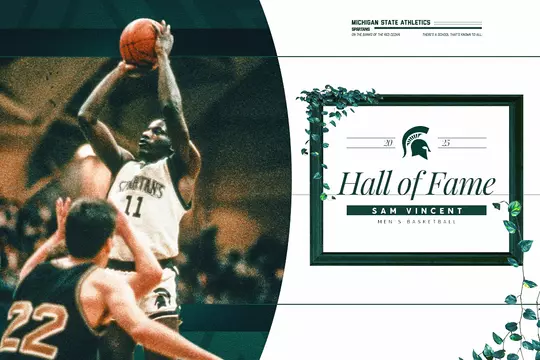
Sam Vincent
Men’s Basketball (1981-85)
Lansing, Mich.
Sam Vincent didn’t realize the impact basketball would have on him, and his life, when he first started playing the game.
As a youngster growing up in Lansing, and through high school at Lansing Eastern, to his days at Michigan State, where he became one of the top players in program history, to the NBA, where he won an NBA Championship with the Boston Celtics, and in the 40 ensuing years since he graduated and became a coach, the game has allowed him to impact lives around the world.
“When I first started playing, I didn’t have big, big dreams in terms of global projects or reach, particularly with basketball,” Vincent said over the phone from South Africa. “My goal was to follow in the footsteps of Jay (Vincent, his older brother) and Magic (Johnson), but as time evolved, and I got to college and reached the professional ranks, I think that’s when an interest grew in trying to have a bigger impact on the game.
“I never would have thought that I’d reach multiple international countries and have the ability to teach and coach the game as I’ve had coming from Lansing. But it’s been an incredible journey.”
Vincent credits much of the success and opportunity he’s had in his life and career to his time at Michigan State. That’s why it meant so much when he learned that he was part of Michigan State’s 2025 Athletics Hall of Fame class.
“It means everything, really, it does,” Vincent said. “I think coming from Lansing, neighboring East Lansing, playing at (Lansing) Eastern and having always looked over to Michigan State as the ultimate destination and to be part of, and to make it there and to now be recognized as a Hall of Fame honoree, it’s special. And to be one of the names in the 2025 Class, including Coach (Mark) Dantonio who signifies everything you to want to be connected to as a coach and a person, it’s just such an honor to be in the Hall of Fame and associated with this class.”
Vincent graduated from Michigan State in 1985, and 40 years later, he still stands among the top 10 all-time in scoring, currently No. 8 all-time with 1,851 points.
He came to Michigan State as a freshman in 1981-82 just after his older brother Jay, who ranks No. 7 all-time in scoring, graduated. Following in his brother’s footsteps was part of it, but he also grew up with the Spartans.
“I think that was a big part of it, but even before Jay came, there was Kirk (Gibson), there were football legends that I remember either watching on TV or supporting,” Vincent said. “There was Terry Furlow and Bob Chapman. There were guys I connected with. But when Jay and Magic came along, it became more of a reality that I could come to Michigan State.”
Playing alongside one of the all-time leading scorers in Michigan State history, Scott Skiles, who ranks No. 3 all-time, Vincent paved his path. He started 27 of 28 games as a freshman, averaging 11.7 points. As a sophomore, he led the team in scoring with 16.6 points and was an All-Big Ten Second Team selection.
That was the first of three-straight years leading MSU in scoring. He averaged 15.6 points in 1983-84 to earn All-Big Ten Third Team honors. And as a senior in 1984-85, Vincent averaged 23.0 points to help lead the team to its first NCAA Tournament appearance since the Spartans won the national championship in 1979, earning first team all-conference recognition.
Vincent was named an All-American that year, earning first team honors from the Sporting News, second team accolades from Basketball Times and the National Association of Basketball Coaches and third team recognition from the Associated Press and United Press International. He joined his brother Jay (1981) as the only Spartan brothers to earn All-America honors and led the Big Ten in scoring with 23.7 points, one of eight Big Ten scoring champions all-time at MSU, the year before the 3-point shot became a permanent part of college basketball.
“I remember a lot about that senior year,” Vincent said. “I felt like it was my best individual year, but there was so much more I wanted to accomplish for the team. It meant a lot (to make the NCAA Tournament) because the previous years, we hadn’t had that success.
“I kind of looked at it like, we reopened that door and then the next year, they went further. There was a lapse there from the championship years to get back there, and it felt really good to bridge that gap and participate in it. I just wish we could have gone further.”
Vincent finished his career at MSU ranked third all-time in scoring (now eighth), averaging 16.8 points, while shooting 52.9 percent from the floor and starting 109 of 110 games played. His career did not have the NCAA Tournament legacy he desired, but in his one appearance, against Alabama-Birmingham in 1985, he scored a game-high 32 points in 39 minutes.
Following his graduation from MSU, Vincent was the 20th pick in the first round of the 1985 NBA Draft by the Boston Celtics. He spent two years in Boston, winning an NBA Championship in 1985 with one of the greatest teams in league history, and played seven total seasons, including stints with the Seattle Supersonics, the Chicago Bulls and the Orlando Magic.
Following one year playing in Greece in 1993-94, Vincent’s global impact truly started. Internationally, he has coached teams in Greece, the Netherlands, Bahrain and South Africa, Nigeria. At the 2004 Summer Olympics, he led the Nigerian women’s basketball team to the first-ever victory by an African nation.
Closer to home, Vincent coached for two seasons in the NBA, first as an assistant for the Dallas Mavericks in 2006-07, before being named head coach of the Charlotte Bobcats, where he worked for one year in 2007-08. He also had coaching stops with teams in the NBA G League (also known as the National Basketball Development League and the NBA D-League).
In 2022, he became the head coach at Beacon College in Florida, a liberal arts school that specifically serves students with learning differences, before returning to Africa in 2025 as a head coach in the Basketball Africa League.
But his hometown and his college have never been far away. He returned to Michigan State in 2024 to serve as the grand marshal for the annual Homecoming parade and is eagerly anticipating returning in the fall for hall of fame induction.
“I think coming back in 2024 and having a chance to be the grand marshal was very special,” Vincent said. “It gave me a chance to reconnect with the community in a deeper sense. I was on campus more and spent more time with people and appreciated the opportunity and the journey I had.
“Being in the 2025 class, it’s just an incredible honor. It can happen a lot because of what someone did on the court or on the field, but in some ways, I think it’s some of the off-court things in terms of supporting and developing and coaching and getting involved internationally and sharing things that I’ve learned in my career. It’s always rewarding when I get the chance to come back to where I started. I’ve said it a lot, I could be in South Africa, but I always find a connection to Lansing and Michigan State.”

